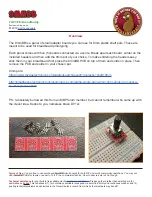
-> You may be looking at a faulty tube or another defect. In this case,
be sure to take the preamp to an authorized, professional service center.
-> Is there a connection (for example, via a shielded circuit) between the
amp and another device that is grounded via a power plug of its own?
Two or more circuits sharing a common electrical ground line can cause
audible hum. If low-frequency noise is emanating from your rig,
be sure to consult a specialist.
-> The amp and mains grounds are not connected properly or are altogether
disconnected. Have an experienced specialist check this.
-> Cords connected to the input or effect loops may not be shielded properly.
Replace them to check if this is indeed the case.
-> The amp or speaker cords may be picking up interference from powerful
magnetic fields (for example, of nearby power transformers or electrical motors).
Reposition the amp and connector cables.
-> The amp or speaker cords may be picking up radio signals, for example,
from activated mobile telephones or powerful local transmitting stations nearby.
Switch off mobile phones while troubleshooting noise problems.
-> The given power tube is probably defective. If that power tube's fuse is replaced
and the new fuse also blows, the tube needs to be swapped out.
-> The amp has been overloaded, perhaps by excessive volume levels, excess mains
voltage, or the wrong output impedance (where the impedance setting does not
match the connected speaker's impedance).
Check the speakers' overall impedance and, if necessary, adjust your setup
accordingly (see the list on page 16). Refer to section 28 for some more key facts
about tube defects.
* The speaker is emitting humming noises:
* One of the power tube fuses blows:
19











































